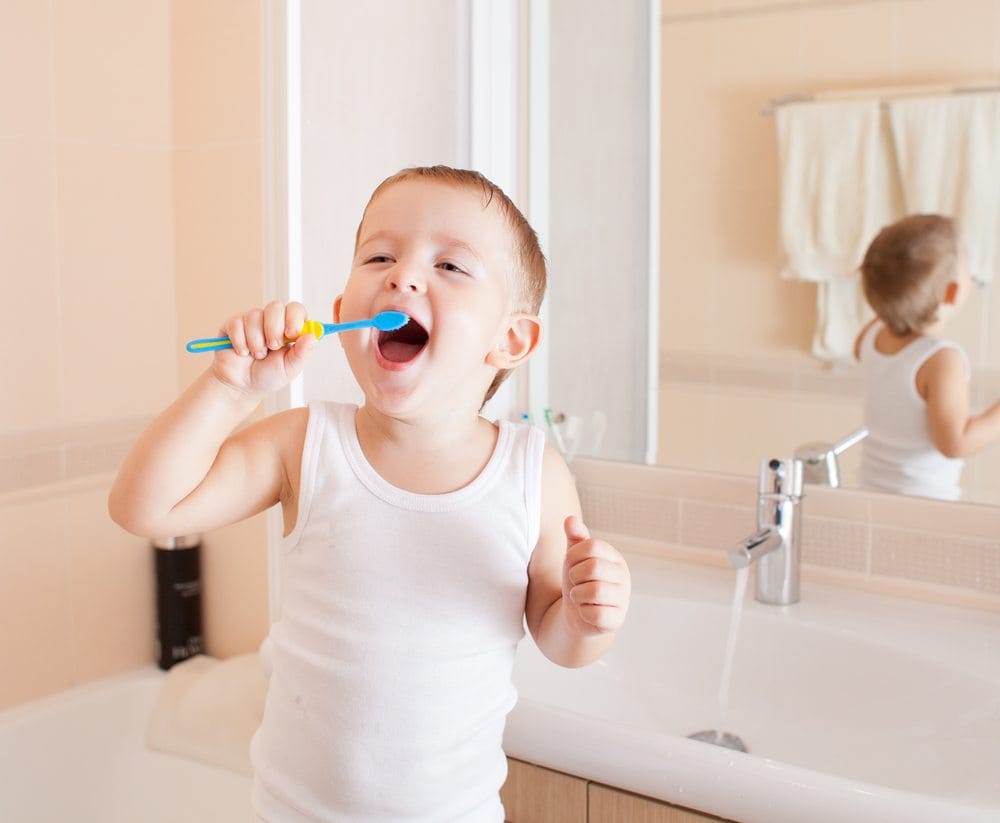Did you know that good dental hygiene plays an important role in child development? In fact, how well you care for your child’s teeth has a direct impact on their ability to speak, smell, swallow, chew, taste, make facial expressions, and show emotions.
With so many important sensory, social and emotional consequences at stake, it makes sense that you would want to know the best way to approach your child’s dental care. Here you will find a few guidelines that provide the information you need to know to ensure your child’s proper oral hygiene.
Providing Proper Oral Hygiene
Your toddler’s primary teeth will begin to emerge between 5 to 10 months after birth. Usually, the lower central incisors are the first to show. However, the rate of teeth growth depends greatly on hereditary factors. So, if your teeth grew in quickly, odds are that your baby’s will too. Regardless of how quickly your toddler’s primary teeth, or baby teeth, emerge, you will want to begin practising good dental hygiene as soon as his or her first tooth surfaces.
Here at ToothStars, we believe it’s never too early to begin planning a proper oral hygiene regimen for your child. By the age of three, most children will have all twenty of their primary teeth and will then begin to replace them with their permanent teeth. Therefore, as brushing becomes essential, you will need to consider other aspects of oral care, such as flossing, rinsing, and whitening.
Brushing
After the first tooth appears, regular wipes with a clean, damp cloth are all that’s needed to prevent the build-up of acids and sugars that contribute to caries or tooth decay. When more teeth began to surface, we recommend using a small, soft toothbrush for regular cleaning. As your child gets older, you may want to consider switching to a larger manual or electric toothbrush.
Flossing
Once your toddler has two teeth that touch together, we suggest that you begin a flossing regime. There is a variety of floss picks for children designed specifically to help remove food and plaque from within small mouths. However, other flossing devices, such as water flossers, might be a good alternative when your pre-teen or teen child develops the degree of dexterity necessary to manage good dental hygiene on his or her own.
Rinsing
Although we suggest that children under the age of six use mouthwash only under the recommendation of a dental professional, there are benefits for adding mouthwash to your pre-teen and/or teenager’s oral care routine. The most important benefits are:
- Fresh breath
- Protection against acid that causes bacteria and leads to tooth decay
- Protection against plaque build-up for children with braces
Supervised Brushing
To ensure your child has proper dental hygiene, it may be necessary to supervise their oral hygiene routine to guarantee success. Naturally, you will want to have a very “hands-on” approach to the brushing and cleaning of your toddler’s teeth. However, even as your child reaches an age when manual dexterity is prevalent, you will want to make sure that your child is brushing, flossing and rinsing the correct way. By the teenage years, you will still want to supervise brushing from time to time to ensure that proper care is occurring; however, your child should have the fine motor skills required to do the job on his or her own.
Fluoride
Children living in communities with fluoridated tap water have fewer decayed teeth than children who live in areas where their tap water is not fluoridated. If you suspect that your water source does not have fluoride, your child may need supplements once he or she is six months old. Be sure to check with your child’s dentist or paediatrician for recommendations to prevent excessive cavities. Your healthcare professional will prescribe oral fluoride supplements, like drops, tablets, or lozenges if such steps are necessary.
Proper nutrition
Healthy food choices go a long way in helping your child prevent tooth decay. Fruits and vegetables that contain a high volume of water are usually best. We suggest that your child eats sweets directly after eating a meal when saliva production is high and can help fight against acid build-up. If you child chooses to snack on sweets or sticky foods such as honey, granola bars or raisins, we advocate that he or she brush his or her teeth immediately. If you child must snack, here are some of the teeth-friendly foods that we recommend:
- Fruits and vegetables (particularly melon, pears, celery, cucumbers)
- Cheeses (particularly cheddar, Monterey Jack, and Swiss)
- Calcium builders (Broccoli, yoghurt and milk)
- Offer your child water instead of juices and soda
- Foods that are naturally low in sugar
Proper Dental Hygiene Quiz for Parents
Test your oral health knowledge. Answer true or false to each of the questions and verify your understanding of proper dental hygiene for children.
Questions:
- _____All children should have fluoride supplements regardless of age or diet.
- _____Parents should begin regularly cleaning teeth once their child’s first tooth emerges.
- _____Children under age 6 should use mouthwash unsupervised.
- _____Swiss cheese is a poor food choice for maintaining good dental hygiene.
- _____Children under 6 years are capable of brushing their teeth without supervision.
Answers: 1. F, 2. T, 3. F, 4. F, 5. F
Sadly, good oral health does not begin to compete in popularity with topics such physical fitness or weight management. However, despite the fact that people often take dental health for granted, it remains an essential element to overall health and development, especially for children. Therefore, when there are significant social, emotional and physical consequences at risk, it’s in your best interest to be sure your child has a good dental hygiene plan in place. It’s never too soon to begin making proper dental hygiene a priority. Using the information provided in this quick printable guide will help you provide your child with the tools to ensure positive overall development.
